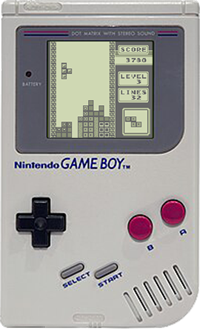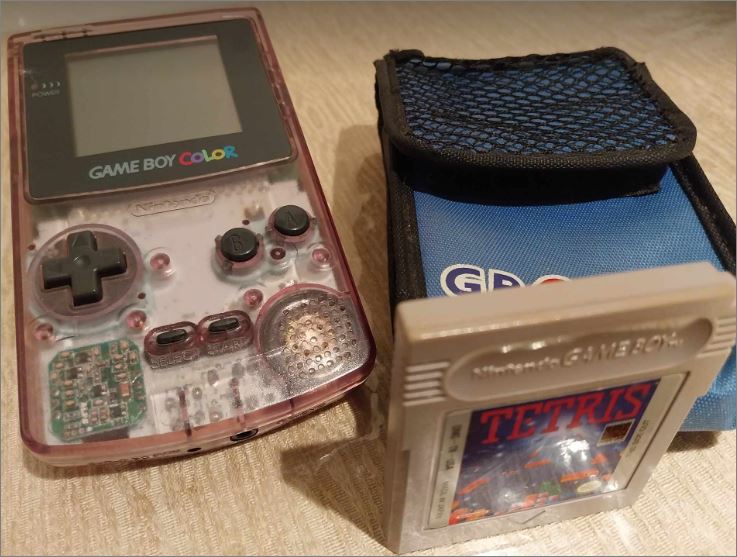Game Boy (GB) and Game Boy Color (GBA)

Released in April 1989, the Game Boy is an 8-bit handheld game console developed and manufactured by Nintendo. Its immense success kept it in production until 2003.
- Launch Price (US): $89.99 (approx. $212 in 2023 money)
- Total Sales: Approximately 118.5 million units sold worldwide (Game Boy and Game Boy Color combined)
![]() THE GAMEBOY AT A GLANCE
THE GAMEBOY AT A GLANCE
The Game Boy debuted in Japan and the United States in 1989, followed by a European release in 1990. It featured a CPU manufactured by Sharp, based on the Intel 8080 and Zilog Z80 architectures.
- Discontinued: 2003
- Available Colors: Grey, transparent, black, white, red, green, yellow, blue
Tech Specs
- Dimensions: 148 x 90 x 32 mm | Weight: 220 g
- CPU: Sharp LR35902 at 4.19 MHz
- Display: 2.6" STN LCD with 4 shades of grey
- Sound: Built-in mono speaker with stereo headphone output
- Memory: 8 KB RAM, 64 KB addressable space
- Cartridge ROM: 64 KB – 512 KB
- Battery Life: ~15 hours (4× AA batteries)
Related Models
- Game Boy Pocket (1996)
- Game Boy Color (1998)
- Game Boy Advance (2001, 32-bit)
- Game Boy Micro (2005)
GAME BOY COLOR
 Launched in 1998, the Game Boy Color introduced a full-color TFT screen while retaining backward compatibility with original Game Boy cartridges. It was more compact, faster, and more colorful.
Launched in 1998, the Game Boy Color introduced a full-color TFT screen while retaining backward compatibility with original Game Boy cartridges. It was more compact, faster, and more colorful.
- Launch Price (US): $79.95 (approx. $140 today)
- Games Library: About 800 titles, including compatibility with original Game Boy games
- Available Colors: Blackberry red, neon green, yellow, turquoise, purple, clear purple, Pokémon Special Edition
Technical Specifications
- Dimensions: 133.5 x 78 x 27.4 mm | Weight: 138 g
- CPU Speed: 8 MHz
- RAM: 32 KB
- Display: TFT screen, 56 colors on-screen from a 32,000-color palette
- Battery Life: ~10 hours (2× AA batteries)
 GameBoy Graphics
GameBoy Graphics
Classic Game Boy
- Resolution: 160 × 144 pixels
- Colors: 4 shades of grey (2-bit)
- Sprite Limit: Up to 40 sprites per screen
- VRAM: 8 KB
- Background + Sprite-based display
Game Boy Color
- Resolution: 160 × 144 pixels
- Colors: 56 on-screen simultaneously from a 32K-color palette
![]() Audio Capabilities
Audio Capabilities
- 2 Pulse Wave Channels
- 1 PCM 4-bit Sample Channel
- 1 Noise Channel
- Audio Input from Cartridge
- Mono Speaker (Stereo via headphones)
 Expansions & Accessories
Expansions & Accessories
- Game Link Cable (supports up to 4 players)
- Game Boy Four Player Adapter
- Handy Boy: Dual speakers + illuminated magnifier
- Light Boy: Screen magnifier with light
- Game Boy Printer
- Game Boy Camera
- Transfer Pak
- Action Replay: Cheat device
- Mobile Adapter GB: Connects to mobile phones for remote play
- Many third-party accessories also exist, especially for the original Game Boy
 I/O Ports & Connectivity
I/O Ports & Connectivity
- Cartridge Slot: Top-mounted
- External Power Jack: 6V DC (left side)
- Headphone Jack: Stereo output
- Link Port: Serial connection (right side, 512 kbit/s)
Controls
- Power switch (top)
- Contrast control (left side)
- Volume control (right side)
 Games Library
Games Library
- Original Game Boy: ~1,040 official titles
- Game Boy Color: ~800 compatible titles
- Best-Selling Game: Tetris – 35 million units
- Top Seller: Pokémon Red & Blue – 23.64 million units
- Amazing Tater (1991) – Valued over $10,000
- Kid Dracula (1993) – Over $3,000
- Spud's Adventure (1991) – Over $3,000
- Ninja Boy 2 (1991) – Over $3,000
- F1 Pole Position (1993) – Over $2,500
Shops
■ GameBoy
Binaryvalue.com (c)
Main Sources:
![]() > FIND MORE
> FIND MORE
□ BinaryValue.com
» Sega Saturn
» Sega Mega Drive
» Vectrex
» Atari Jaguar
» CD32
» Atari Lynx
» Game Boy






